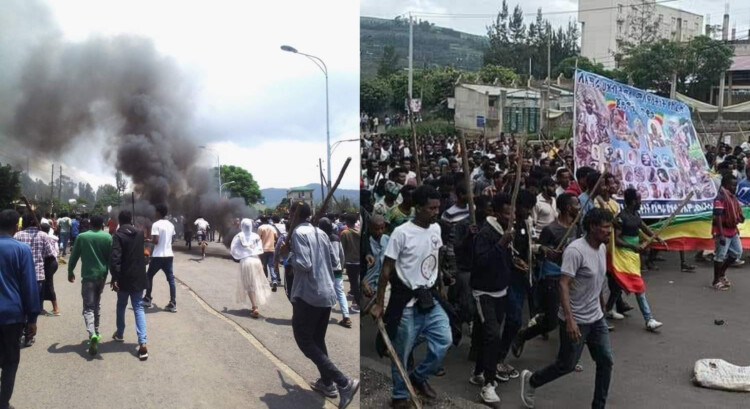Update 🚨: After heavy clashes Amhara/Fano forces have captured the strategic town of Arerti Minjar. Which is only 35 mi to Addis Ababa and 12 miles from Addis-Djibouti Railway. This is very significant!!! pic.twitter.com/konre14aLd
— Amhara News Service (@Amhara_News) August 7, 2023
Amhara’s regional forces and local militias played a crucial role in supporting Ethiopia’s army during the Tigray conflict. While the peace deal brought an end to the active war, Amhara special forces and Fano fighters continued to control Western Tigray, a fertile region claimed by both Tigray and Amhara. These forces’ continued presence and influence have heightened nationalist sentiments in Amhara, leading to protests against the government’s integration plans.
The recent transformation in the Amhara struggle is truly incredible. For a long time, the movement was disunited and focused on victimhood, which limited its impact. People were merely reacting to massacres, crying and wailing instead of taking action. However, it is now… pic.twitter.com/u6t6YNq8XJ
— Abebe Gellaw (@abebegellaw) August 7, 2023
Ethiopia’s internal conflicts have the potential to destabilize the entire region, exacerbating existing tensions between different ethnic and political groups. A prolonged state of emergency and further violence in Amhara could create a spillover effect, impacting neighboring countries and potentially drawing them into the conflict. Such instability threatens regional security and could disrupt economic activities and humanitarian efforts in the area.
Today, there have been widespread demonstrations in Gondar against the fascistic and genocidal war that Abiy's government has launched on the Amhara people. The world didn't pay as much attention to the ongoing war in Ethiopia as it should have.
@_AfricanUnion @UN @EU_Commission pic.twitter.com/vv37NSnlN3— Tilahun Tsige (@Menilikism) August 7, 2023
Relevance to the United States
The situation in Ethiopia holds significance for the United States due to several factors. First, Ethiopia is a strategic partner in the region, and its stability is essential for U.S. interests in Africa. The U.S. has long engaged with Ethiopia on various issues, including counterterrorism, regional security, and economic cooperation. A destabilized Ethiopia could impact these areas of collaboration and potentially hinder U.S. efforts to address regional challenges.
Second, the ongoing conflict in Ethiopia has implications for human rights and humanitarian concerns. Reports of attacks on civilians, property damage, and restrictions on movement raise serious humanitarian concerns. The United States has a vested interest in promoting human rights and supporting humanitarian efforts worldwide. The situation in Amhara could trigger a refugee crisis, further straining resources and requiring international assistance.
Third, the U.S. is committed to promoting democracy and peacebuilding globally. The escalating violence in Ethiopia challenges these values, and the U.S. may seek to engage with the Ethiopian government and regional partners to find diplomatic solutions and foster peace and stability in the region.
~
In conclusion, Ethiopia’s declaration of a state of emergency in response to the escalating violence in Amhara holds significant implications for global peace and security. The country’s internal conflicts have the potential to disrupt regional stability and exacerbate humanitarian concerns. The United States, as a strategic partner in the region and a proponent of human rights and democracy, has a vested interest in the situation’s peaceful resolution. To address the challenges in Ethiopia, international cooperation and diplomacy are crucial to finding lasting solutions and preventing further escalation of violence. The world will be closely monitoring the developments in Ethiopia and working towards ensuring peace, stability, and prosperity in the region.










COMMENTS